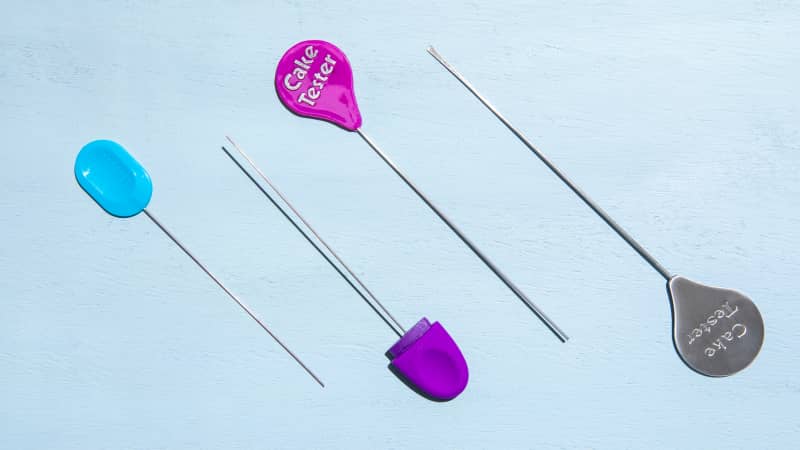The Best Parchment Paper
Equipment Review
Restaurant cooks swear by cake testers. But are they useful for home cooks?
Published June 22, 2020.

Cake testers are beloved by restaurant cooks, who use these fine metal probes to check the doneness of not only baked goods but also vegetables, meat, and fish. We were curious to see if these tools were truly as useful and versatile as we’d heard. So we bought four cake testers, priced from about $3.00 to about $6.50, and used them to test the doneness of Olive Oil Cake, Classic Quiche Lorraine, Chocolate Sour Cream Bundt Cake, and boiled potatoes at different stages of their cooking times. Along the way, we compared the cake testers’ results to those of the tools we might otherwise use to check the foods’ doneness: a bamboo toothpick or bamboo skewer for the baked goods and our favorite paring knife for the potatoes.
We liked a few things about the cake testers. At 4 to 6 inches in length, their probes were all fine for poking shallow quiches and tall Bundt cakes alike. They can be washed and reused, eliminating the need to keep buying new disposable toothpicks or skewers. And they allow for prettier, more presentation-ready baked goods. Because most of the cake testers had probes that were fine and narrow, with a diameter of about 1 millimeter, they made holes that were much tinier than those made by the toothpicks (which had an average thickness of 2 millimeters) and bamboo skewers (which had an average thickness of 3 millimeters). While it was thin, the paring knife also made larger incisions than the needle-like cake testers.
Ultimately, these advantages were overshadowed by a basic problem: The cake testers didn’t always give an accurate reading of the foods’ doneness. They were fine for evaluating whether the potatoes were cooked or not. Trouble arrived when we were testing the baked goods. In the test kitchen, we deem most baked goods done when a probe comes out clean, indicating that the batter inside has cooked through and the crumb is fully set. But sometimes we look for a moister texture in certain cakes, including our Chocolate Sour Cream Bundt Cake. For these, we want to see a few crumbs attached to the probe as proof that the cake is not completely dry. To our dismay, the cake testers came out clean every time we poked them into the cakes and quiche—except when the batter was still practically raw inside. By contrast, the bamboo skewers and toothpicks consistently gave us more accurate results, emerging clean when the cakes were fully baked and with crumbs when the interior was still moist.
What was going on? It turns out that while cake crumbs catch easily on the rough, textured surfaces of the bamboo skewers and toothpicks, th...

The mission of America’s Test Kitchen Reviews is to find the best equipment and ingredients for the home cook through rigorous, hands-on testing. We stand behind our winners so much that we even put our seal of approval on them.

Miye is a senior editor for ATK Reviews. She covers booze, blades, and gadgets of questionable value.

This is a members' feature.